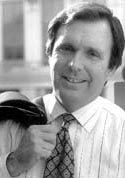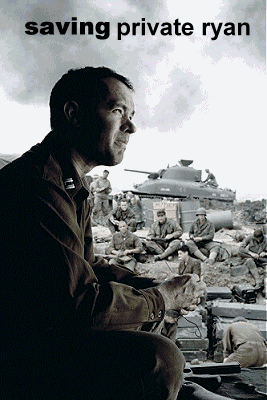|
|
|
|

Neal M.Sher
IT IS IMPOSSIBLE TO WATCH Steven Spielberg’s powerful epic, Saving
Private Ryan, and not be deeply moved.
The theater was packed with
teenagers, baby-boomers like myself, and a number of grandfatherly men
who were obviously veterans of The War, some may have even landed on
D-Day. One can only imagine what these men, the last to leave the
movie house, must have been thinking -- or who they were thinking about --
as they wiped tears from their eyes. Their reaction said it all and,
more than anything else, confirmed what critics have been saying: that
it is the most realistic depiction of WW II put to film.
Private Benjamin Sher landed in Normandy and
fought through France until the war ended for him when shrapnel from a
German land mine ripped through his body.
After months in traction and rehabilitation he returned to the States
and, like most other vets, began to build a life and a family; the most
visible effects of the war were the periodic pain in the hip (his
weather predictions were always on the money) and the monthly disability
checks from the government.
To be sure, my father spoke about his time in the service, the guys he
served with, and he occasionally described with anger the raw
anti-Semitism he encountered in some quarters. He came back with a
bunch of medals, but he never bragged about or displayed them. I saw
them for the first time -- along with his dog tags and other
military documents -- only after he passed away 8 years ago as I combed
through the contents of the olive drab government issue first aid kit
which served as a safety box for his important papers.
In many ways our discussions about the war were superficial, never
touching on how he felt or what it was really like. Judging from the
many stories which have appeared since the release of the movie and
after talking with friends whose fathers were also there, my father’s
reaction was typical. They were there to do a job and come home. No
elaboration needed.
And there certainly was never any pontificating or soul searching about
why he and his generation had to fight the war, or what the consequences
of failure would be. I’m sure if I had asked him about it , he’d shake
his head and give me one of those devastating "Smarten up! Is this
what I sent you to college for?" looks.
Nor, I might add, was there ever any talk of heroism or bravery, even
though he and the other vets had every right to be just a little bit
boastful. They had no need for it; wasn’t their style.
Growing up, Dad always seemed larger than life, whether taking me by his
powerful hand as we ascended the famous ramps at Yankee Stadium on our
way to see The Mick, Yogi and Whitey, or giving hell to some Teutonic
househunting couple who made the mistake of asking Ben, rather
derisively, whether ours was one of those "Jewish neighborhoods." My
guess is that they fled the State of New York, never to come within a
hundred miles of where we lived.
To me, he was as tough as they made ‘em; a scrappy street fighter who
took guff from no-one. I just couldn’t imagine him knowing the
meaning of fear. I will always have that image of him. But Saving
Private Ryan gave me a different, expanded perspective.
Naturally, I have thought of my father often since his death in 1989
(ironically, it was the first time he had set foot in a hospital since
the War).
Especially in times of celebration. But there was an indescribable sense
of loss and sadness which took hold of me as I watched the film. I
wanted so badly to be able to see it with him; to be there next to him
as he re-lived that life-changing experience.
Most of all, I wanted to sit with him over a beer -- preferably at his
favorite spot, Belmont Race Track -- and hear how it was and to watch the
intensity of his emotions. Although it would have been very tough for
him, to hear of his vulnerabilities and fear would have only enhanced
his stature in my eyes, especially since he was a man of few words. I
also know that it would have made our bond even stronger than it was.
While I’ll never hear it directly from him, thanks to Spielberg’s
masterpiece I have a pretty good idea how Private Benjamin Sher would
have explained to his son how he felt about the work he did in Europe
54 years
Jewish World Review / August 20, 1998 / 28 Menachem-Av, 5758
 Spielberg’s special
Spielberg’s special
gift to me
 As I watched Private Ryan, my thoughts kept returning to one of the
countless GIs who landed on the beaches, did what he had to do, helped
win a war (and in the process save the world), and came home. I kept
seeing images of a tough 22 year-old kid from New York’s Lower East
Side who had married to his high school sweetheart just before
shipping out to England.
As I watched Private Ryan, my thoughts kept returning to one of the
countless GIs who landed on the beaches, did what he had to do, helped
win a war (and in the process save the world), and came home. I kept
seeing images of a tough 22 year-old kid from New York’s Lower East
Side who had married to his high school sweetheart just before
shipping out to England.
JWR contributor, Neal M. Sher, is a partner in the Washington law firm Schmeltzer, Aptaker and Shepard and is the President of the American section of the International Association of Jewish Lawyers and Jurists. He is the former Director of the Office of Special Investigations in the Justice Department and the former Executive Director of American Israel Public Affairs Committee.
6/22/98: Sweep the Holocaust Museum clean
5/20/98: The Case of Dinko Sakic: A Whitewash In The Making?
4/5/98: Judge Gilbert Merritt's Obsession With Jews (Demjanjuk, part II)
3/22/98: The Continuing Saga of Ivan Demjanjuk
3/1/98: Shameful Scapegoating At The Holocaust Museum